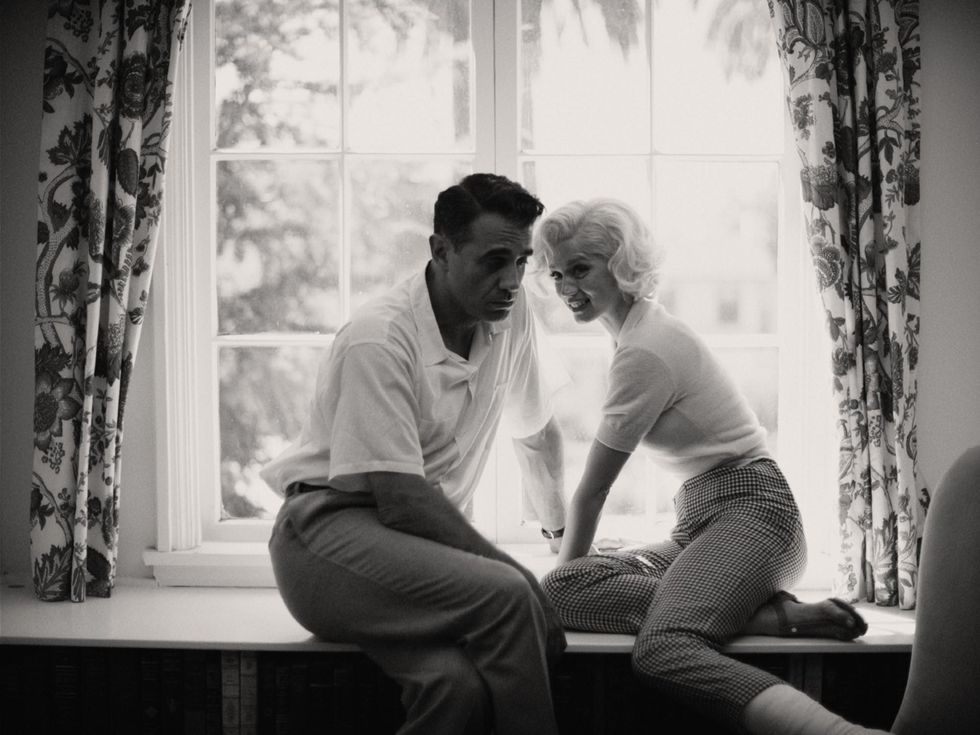Movie Review
Blonde chronicles the mostly miserable life of Marilyn Monroe

Ana de Armas in Blonde
American celebrities are simultaneously some of the most admired people in the world and the most scrutinized, both simply because they are in the public eye a lot. Some people seek that attention and some people thrive in it once they get it, but there are others for whom fame is toxic, something that makes their life immeasurably worse.
The new epic-length Netflix film Blonde is far from the first time that it’s been said that Marilyn Monroe was exploited in her relatively short life and career, but it does seem to revel in that misery more than most. Close to a cradle-to-grave story, the film follows Norma Jeane Baker (Ana de Armas) from her traumatic childhood with a mentally unstable mother (Julianne Nicholson), to burgeoning stardom full of lascivious studio heads and producers, to icon status as Marilyn Monroe, featuring marriages to Joe DiMaggio (Bobby Cannavale) and Arthur Miller (Adrien Brody), as well as one very high-profile affair.

Written and directed by Andrew Dominik, the film is among the most depressing movies about a celebrity one could imagine. Dominik, adapting his story from the 2000 fiction novel by Joyce Carol Oates, seems to posit that Norma Jeane/Marilyn’s life had close to zero happiness in it, and even when she did experience fleeting moments of joy, they were tinged by other people taking advantage of her or expecting something more from her than she could give.
More than anything else, it depicts Marilyn as someone forever scarred by her childhood and unable to adequately function on her own as an adult. Every man who comes into her life is looked at by her as some sort of replacement for her absent father, especially DiMaggio and Miller, both of whom she literally calls “Daddy.” If there’s a moment where she felt some sort of power or control over her own life, it’s not depicted in the film.
The film is striking visually because Dominik constantly shifts between video aspect ratios and going back-and-forth from color to black-and-white. The visual choices are likely not as haphazard as they can seem, but there are only a few instances where an aspect ratio or color choice makes an impact on the actual story.
Also notable is the fact that it's rated NC-17, a rarity for any film released in the U.S. There is a good amount of nudity, but the rating likely stems from one highly suggestive sex scene that seems to explicitly depict an act that it doesn’t actually show. It’s difficult to reconcile the way Norma Jeane/Marilyn is treated by the other characters in the film and how the film seems to linger on her nakedness and vulnerability; the exploitation can often seem equal.

For all of the discomfort the film causes, de Armas’ performance is fantastic. She embodies Marilyn in many ways, but it’s the eyes – the way she makes them big and darts them back and forth, as if unsure of herself – where she fully becomes her. At no point does the fact that de Armas is of Cuban/Spanish heritage detract from her depiction, helped by her portrayal and the cinematography.
Blonde can often be difficult to watch, both for the material it contains and because it has a nearly three-hour running time. It may or may not add to the mythos of Marilyn Monroe, but it has found an actor in de Armas who knows exactly how to bring her life one more time.
---
Blonde debuts on Netflix on September 28.
